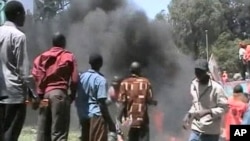In the agonizing months following the disputed December 2007 elections, more than 1,200 Kenyans lost their lives, some 600,000 people were displaced, and millions of dollars' worth of property was destroyed.
The two main presidential candidates signed a power-sharing agreement at the end of February 2008.
The power-sharing deal led to commitments to stop the violence immediately, overcome the political crisis, promote reconciliation and healing, and implement long-term government and security reforms.
A government body known as the Waki Commission released a report in late 2008 calling for Kenyan authorities to set up a Special Tribunal to investigate the post-election violence and bring perpetrators to justice, or hand the case over to the International Criminal Court (ICC).
The first part of 2009 saw lawmakers argue about, and eventually reject, the Special Tribunal.
Mwalimu Mati is executive director of the government watchdog, Mars Group Kenya:
"When we look at the Waki Commission [and] the Kenya National Commission on Human Rights' investigation into post-election violence, both of them describe a situation in which high-level politicians, aspects of the business elite, prominent Kenyans really, are the organizers, the financiers, and the masterminds behind the post-election violence," he said.
The ICC kept a keen eye on events unfolding in Kenya.
In July, a high-level Kenyan government delegation met with ICC Prosecutor Luis Moreno-Ocampo in The Hague and set September 30 as the deadline to set up the Special Tribunal.
Around the same time, power-sharing mediator and former United Nations chief Kofi Annan handed Moreno-Ocampo a sealed envelope with the names of top suspects.
The deadline to set up the Special Tribunal came and went.
Government spokesman Alfred Mutua says the failure to set up the tribunal was due more to technical errors than lack of political will.
"To tell you the truth, the government is not very pleased with the whole idea of the ICC taking over the prosecutions," he explained. "This is because as a country we should be able to manage our own internal affairs."
Mars Group Kenya's Mati disagrees.
"In order to accept that there will be accountability through the Special Tribunal, the government has to sacrifice some of its members or make them subject to domestic court proceedings," he said. "This is a political sacrifice they are unwilling to make."
On November 26, Moreno-Ocampo announced he would ask ICC judges to open investigations to identify and prosecute high-level perpetrators. Earlier that week, he invited victims of the post-election violence to submit their testimonies to the ICC.
"These alleged crimes were part of a widespread systematic attack against the Kenyan civilian population," he said.
ICC involvement is good news for Kenya, says Muthoni Wanyeki, executive director of the Kenya Human Rights Commission.
"I think it sends a very, very powerful message to those who are involved in the violence at all levels that this is not going to go away, that the survivors' needs must be paramount, and that there will be an accounting," she said.
Mars Group Kenya's Mati says he thinks the domestic judicial system is unable to handle all the cases of post-election violence.
He says referring high-level cases to the ICC and setting up the Special Tribunal will speed up delivery of long-awaited justice in Kenya.
But human rights activists say they are worried about the safety of those sending evidence to the ICC. They say Kenyan government structures to protect whistleblowers are weak or non-existent.
News
Government, Kenya Human Rights Commission Disagree over ICC Investigation of Election Violence
update

The International Criminal Court is widely expected to announce that it will open investigations to identify and prosecute the main perpetrators of post-election violence in Kenya.





